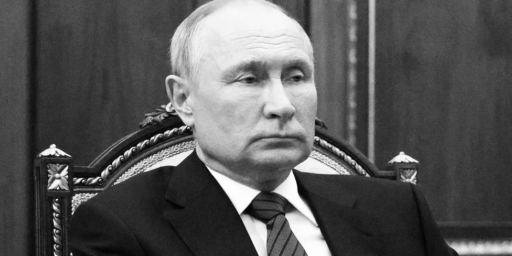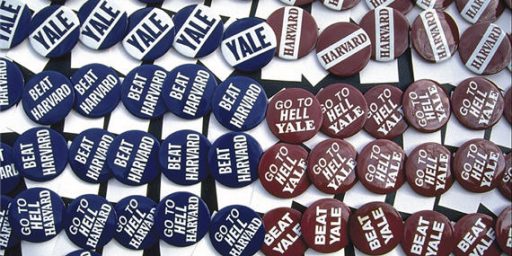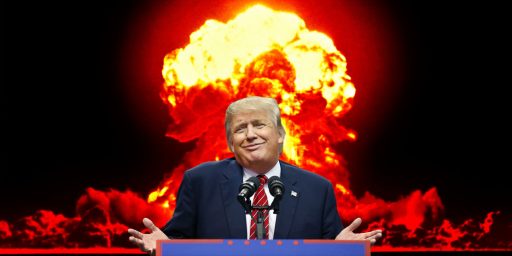The Cold War Was A Sobering Influence For A Silly People
As scary as the Cold War was, it did reduce the silliness in American politics.

From The New York Times:
WASHINGTON — American intelligence officials have concluded that a Russian military intelligence unit secretly offered bounties to Taliban-linked militants for killing coalition forces in Afghanistan — including targeting American troops — amid the peace talks to end the long-running war there, according to officials briefed on the matter.
The United States concluded months ago that the Russian unit, which has been linked to assassination attempts and other covert operations in Europe intended to destabilize the West or take revenge on turncoats, had covertly offered rewards for successful attacks last year.
Clearly, this is a serious national security issue. Just as clearly, there’s a very high probability that we’ll discover that the current regime is handling it far less seriously than earlier ones would have. We know the likely reasons why: Trump’s disturbing bromance for Putin, his gutting of the foreign service, chaos within the White House, attacks on the intelligence community, the elevation of unqualified people like Jared Kushner to handle challenging questions like the Israeli-Palestinian conflict, his denatured staff’s fear of telling him anything he doesn’t want to hear, etc. etc., ad nauseum.
The real problem, however, is that we are not a serious people, in the aggregate. In the 1950s, C. Wright Mills wrote, in The Power Elite, that an increasing number of people were treating national politics with the seriousness of cocktail party conversation. That trend has not ended, and certainly the echo chambers of Balkanized official and social media have accelerated the trend to silliness — even when the topic of discussion is national security, which we used to think was the very last place where we could afford silliness to intrude.
That view was a product of the Cold War, when silliness could lead to the most apocalyptic consequences imaginable. We had to be minimally sober, particularly when selecting leaders who would have to make decisions that could lead to the survival or destruction of the world. Some of those decisions could happen within the span of a few minutes, when the US was facing an imminent Soviet nuclear attack. Some of those decisions happened on longer time frames, such as the funding of the nuclear triad that would deter the possibility of the nightmare scenario ever occurring. The Johnson campaign’s famous 1964 commercial attacking Goldwater’s trustworthiness to handle these dangerous threats was effective, only because there were enough sober-minded voters willing to question whether having an ideological purist was better than a pragmatist in the White House.
Even without terrifying events like the Cuban Missile Crisis, no one forgot that there were thousands of nuclear weapons pointed at the United States and its allies. After the Cold War ended, it was a long time before another crisis occurred — long enough for Americans to get very silly about national security, and by extension, the leaders who were responsible for maintaining national security.
The stakes since 1989, even taking the 9/11 attacks into account, have not been high enough to slow or contain the silliness. The 9/11 attacks were horrific, but they were the last time in 19 years that there were any threats of that scale, or greater, on American soil. The fight to prevent further terrorist attacks has been waged in distant lands, involving people and issues that most Americans do not understand, or care to understand. If asked why we are still involved in Afghanistan, most Americans are likely to give a simplistic answer about fighting terrorists. They might also fall back on a fear of losing. How far we’ve come in 19 years, from saying that Afghanistan was the nexus of all our national security concerns, to now, when we don’t even know why we’re there. Only a silly people believe it’s permissible to act in this fashion.
Way back in 1990, John Mearsheimer wrote in The Atlantic that we would soon miss the Cold War.:
We may, however, wake up one day lamenting the loss of the order that the Cold War gave to the anarchy of international relations. For untamed anarchy is what Europe knew in the forty-five years of this century before the Cold War, and untamed anarchy–Hobbes’s war of all against all–is a prime cause of armed conflict. Those who think that armed conflicts among the European states are now out of the question, that the two world wars burned all the war out of Europe, are projecting unwarranted optimism onto the future. The theories of peace that implicitly undergird this optimism are notably shallow constructs. They stand up to neither logical nor historical analysis. You would not want to bet the farm on their prophetic accuracy.
Mearsheimer was right and wrong on many points. He was writing before the Soviet Union collapsed, so many of his concerns were invalid only a year later. However, beyond his concerns about the messiness of multipolarism, the other interesting part of his essay was its intended audience. Certainly he was directing his comments at the national security officials who read that magazine. He was also addressing a portion of the general public informed and interested enough to entertain how, even with the danger of nuclear annihilation always scratching at the door, there were aspects of the bipolar Cold War that were preferable to the world of, say, the 1930s.
In other words, he was writing for an elite in the United States. He was providing an interesting perspective, and some advice, to the people making and executing national security policy, and a portion of the electorate who most closely monitored what these elected and unelected officials were doing.
Thirty years later, the national security elite is under siege from a willfully uninformed, conspiracy theory-spreading president elected by people who believe that taking seriously weighty issues, including national security, isn’t strictly required. Whatever you think of any particular Cold War president, none of them attacked the national security apparatus the way Trump is doing now. A president might try to restructure the national security bureaucracy to make it more effective. None of them tried to ignore, cripple or kill these parts of the executive branch.
The people supporting this effort are not themselves serious. They include deep state conspiracy theorists, people who think that the US and Russia should be part of the same “war of civilizations,” and nostalgists for 17th century mercantilism. It also includes a larger cohort who is less loony, but who are happy to sit on the sidelines because national security, like other federal matters, isn’t consequential enough to take seriously.
Perhaps that will change. The COVID-19 pandemic may be the crisis that scours the United States of some of its silliness. It’s neither momentary, like the latest school shooting, nor distant, like the very long war with the Taliban. At the elite level, it demands less silliness from our leaders, who need to define a collective strategy and then ensure its implementation. It demands less silliness from us, since our actions have effects on people we see, and the orders of magnitude more whom we don’t see.
We’ve always had some degree of silliness, as we did during the Cold War when a few Americans mouthed their ridiculous opinions from the end of the bar about the Rooskies, the Masons, and flouridated water. Books like None Dare Call It Treason found their audience, long before QAnon and Infowars. We cannot eradicate those opinions completely, but we can make them stay at the fringes.
If the current crisis doesn’t become a talisman against dangerous silliness, then we have truly descended into a kind of national infirmity from which societies don’t normally recover, at least intact.






Bravo.
I think this sort of mentality has been called “amusing ourselves to death.” I call it the 4-channing of America. Trump has unleased the propensity of Americans to sneer at professionalism, ignore morality and ethics, and marinate themselves in self-pity. We’ve given ourselves over to a collection of adult toddlers who have no respect for truth, unspoken (and unwritten) “good neighbor” rules, or acting with integrity.
And boy how they WHINE whenever they don’t get what they want.
We have an educational system handicapped by religion. We can’t teach students how to think when we are never allowed to challenge religious beliefs. You cannot expect people who grow up believing in a magical sky daddy who shakes his head disapprovingly as you masturbate, to respect reason or science or simple logic. The United States is far more poisoned by religion than any other developed country, and in particular by the most primitive and anti-intellectual iterations of religion, and it shows in high levels of ignorance and intellectual incapacity.
Your typical American cannot find Mexico on a map of Mexico. Talk to Europeans and watch their looks of astonishment when it turns out yes, despite being an American, you do know who Bismarck was, and who was on which side of WW2, and that Chile is a country as well as a tasty southwestern dish.
Believers live in a world where reason is a poor relation to faith. This makes everything conditional with the exception of utter nonsense, which must be swallowed whole and believed absolutely. We wonder why people can’t adjust their beliefs to reflect reality? We wonder how a third of the country is lost to a cult of personality?
“Religion is the sigh of the oppressed creature, the heart of a heartless world, and the soul of soulless conditions. It is the opium of the people,” as Marx correctly pointed out, but more relevant today is that religion is the lobotomy of the masses.
Eisenhower was a sober man for sure; in the Suez crisis, for instance, he was willing to break with the UK, France, and Israel. However, I wonder if the Soviet bloc was really itching to attack the US with thousands of nuclear weapons or was that all largely a pretext for the militarization of the US. Before our entry into WW II the military consumed less than 2% for our GDP, and in the period discussed in the posting it was a high as ten percent. We came to see the world as a playing field and had to have bases everywhere on the earth. This inevitably led to the war in Viet Nam. I loved Kennedy (I was a teeny-bopper at that time), but he was an adventurer not a sober guy.
@Slugger:
Few were itching to get into a nuclear war, but everyone was determined not to be too slow to pull the trigger.
@Slugger: I don’t have the historical reference handy, but some newer studies of Stalin’s final years concluded that he was very much ready, and maybe more than a little eager, for a war with the West.
Few Presidents have had more than a tourists knowledge of the world and the last president with a genuine understanding was GHW Bush, but at least the others knew that FA was out of their depth and attempted to surround themselves with qualified advisors. Though in the case of GW Bush, those were disastrous selections.
The voters really don’t care about FA and foreign policy beyond jingoistic statements leading to unserious people seeking positions on the relevant congressional committees and sensitive diplomatic posts going to campaign contributors.
Like much of American life we are getting foreign affairs management that we asked for.
@Michael Reynolds: We had religion during the cold war too, Michael.
A lot of things have changed in America since then, but if anything we are less religious. I’m pretty sure religion isn’t the cause of this, at least not directly. Changes to religion over that time are paralleled by changes in other media and entertainments.
Your thought is, at best, half-baked and incomplete.
@Gustopher:
Yes, we had religion during the Cold War, but I believe @Kingdaddy’s point is that existential threat pushed us toward seriousness. And the nature of that conflict – good and evil in most minds – fit just fine within the same good vs. evil paradigm taught by Christianity.
Now we have more complicated problems. And what are Americans doing? Trying to turn Covid into a good and evil conflict with China.
People need to be taught to think. Generally in schools. Schools which are not able to teach people how to think because to do so brings them into conflict with religion. Without the ability to teach kids to think we get adults who can’t think.
Yes, which is why Millennials have their heads screwed on much better than their more religious elders, you know, the people in power making decisions.
My theory is actually baked quite nicely.
@Michael Reynolds:..You cannot expect people who grow up believing in a magical sky daddy who shakes his head disapprovingly as you masturbate, to respect reason or science or simple logic.
Thank You Stanley Kubrick
RIP
@Michael Reynolds:
I think it’s broader than just religion.
Americans aren’t taught to question authority.* Conversely, authority doesn’t feel the need to account for its actions.
Thus, without external pressures or checks, it’s easy for those in charge to end up overconfident and complacent.
* In any of its forms: political, civil, corporate, religious, etc.
Eisenhower was instrumental in helping to create the religious right.
I’m cancelling Ike.
I’ve been using the term “infantile” to describe American society recently. It’s not just being silly, a significant piece of the country is acting like spoiled children demanding Daddy (always Daddy) fix the toy they threw against the wall and broke. Calling Trump the toddler-in-chief is not just an insult, it’s a disturbingly accurate view of things.
Alternate hypothesis: each generation is getting progressively less religious because they are learning to think.
So when they see the con artist with the bible selling nonsense and telling them their gay friend is going to be tortured for eternity, they correctly give that guy the finger.
@Mister Bluster: Thanks for the General Ripper link. The title picture already had me thinking about Dr. Strangelove. Vera Lynn, who sang, “We’ll meet again, don’t know where, don’t know when.” died a few days ago at 103.
@drj:
Questioning authority begins with doubt. Faith is the cancellation of doubt.
I had a very nice Father’s Day card from my youngest. She thanked me for always having her back (a given) and always telling her the truth. That last made me happy, because we made the unusual decision never to lie to our kids. We didn’t lie about Santa Claus, the Easter Bunny, or ourselves. If there was one thing I wanted my kids to know it was that they could trust me to tell them the truth, including the truth that sometimes I didn’t know, and sometimes I was mistaken.
In fact, my career has prospered for various reasons, but the refrain, from early on has been that we and later I, did not ‘hold back.’ I’ve probably heard that a thousand times from kids who grew up on our/my books. They’re stunned that someone treated them like rational creatures capable of absorbing the truth in all its gray nuance.
We lie to kids. We lie and lie and demand honesty from them. We lie to ourselves and become furious when our kids challenge the lies we insist on believing. The ultimate lie, the foundational lie, is that we live in a world shaped by mystical forces we can only worship and obey, that we are helpless flotsam who have no right to question, and that we are vile and worthless to boot and can only have real value as humans by believing transparent nonsense.
GIGO. As true for humans as for computers.
@Michael Reynolds:
Again, too simplistic, I think.
There are religious traditions (e.g. Calvinism) that combine faith in religious dogma with a certain suspicion of its earthly representants.
Also, the deference to e.g. police or corporate CEOs shows that the problem goes beyond religion.
@Mister Bluster: I’ll see your Stanley Kubrick and raise you a David Lean*:
“As long as the Americans** fight tribe against tribe, so long will they be a little people, a silly people, greedy, barbarous and cruel.”
*Actually written not by this great director by by Robert Bolt and Michael Wilson
** “Arabs” in the original
@gVOR08:..Vera Lynn, who sang, “We’ll meet again, don’t know where, don’t know when.” died a few days ago at 103.
I heard that on the radio and when they played that tune what else could I think about but this.
We’ve always been silly and unserious.
This is a golden aura recollection.
Our “serious” men (not sexist, there were all dudes) delighted in line stepping. It was a big fun game.
Sane people wanted people to not die.
“Serious” people did brinksmanship.
Who is the silly one?
What has happened is that we sorted out ideologically.
We’re not sillier now.
I reject the hypothesis.
@Just Another Ex-Republican: “…a significant piece of the country is acting like spoiled children demanding Daddy (always Daddy) fix the toy they threw against the wall and broke. ”
It’s worse; they are handing Daddy the toy, urging him to break it, refusing to allow Mommy to fix it, and blaming her for it being broken.
@wr:..Lean…Bolt…Wilson…
@Mister Bluster:
Ruta Volodka is a world class name.
In my youth, the balcony was the smoking section.
I always sat in the balcony. As forward as possible and as central as possible.
The downside of the balcony was that you could more easily hear the click clack of the projector which brought you out of the experience.
I’m kinda bummed that kids won’t ever really live through the old-school big ass theater massive screen experience.
Not that mall octoplex bs, but the old big movie houses with names: The Regal or The Orpheum.
Time moves on.
@de stijl:
I don’t recall smoking being allowed in any U.S. theater, but it was permitted anywhere in the audience section in Edinburgh. And there was a guy who played the organ before the feature started.
@Michael Reynolds:
Except schools generally don’t have a lot of religion in them. The things that kids are taught not to think about are entirely secular things.
I worked with someone who was raised in South Carolina*, and taught that while there was some slavery in South Carolina, it wasn’t really a big thing there — slavery was more of a Mississippi thing. She was never exposed to alternative viewpoints, or truth.
Religion never enters into the picture.
I would go further though — the religions held by most of the people you disagree with on topics such as whether we should expose everyone to Covid are the protestant religions, brought about by the Reformation. Martin Luthor’s main point was that an individual’s relationship with God was individual, and that one cannot unswervingly follow the interpretations of the Church. They were founded on a dictate that one must think for oneself.
Without accounting either for the secular schools, or the Protestant Reformation, I think your theory remains unfinished and half-baked.
Perhaps amazing idiocy is what happens when people do think for themselves, because way too many people are just amazing idiots. Or perhaps they are thinking for themselves and consuming terrible, stupid, idiotic misinformation.
Sky Gods watching you masturbate are one of the least messed up things people are taught.
Plus, a whole lot of people on the left are religious. They seem to take the love-thy-neighbor thing a bit more seriously though, or have a broader definition of neighbor at any rate.
—-
*: Or North. We really ought to just combine the directional states. It’s too confusing.
Terribly ironic considering Johnson’s escalation of the war in Vietnam…
@CSK:
Scots kick ass as a general rule.
(my emphasis added).
He was wrong about Europe, apart from Russia and some of their former satellite states. A comment I saw at Dreher’s place, of all things, years ago, put it this way: “You know why France and Germany no longer have guns pointed at each other along their borders, even though they had that for centuries? ‘Cuz they don’t want to. They would rather trade goods, freely holiday in each other’s countries, and have boring meetings in Brussels.”
Most of Europe figured it out. Why can’t we? (Rhetorical question, I know).
@Michael Reynolds: don’t say religion when all you are describing is Christianity.
@Gustopher: Yeah, the bigger problem might not be a lack of questioning authority, as the fact that we are caught up in what Isaac Asimov described:
@SKI: Even in Christianity, he’s only describing the evangelical version and even then fairly characterizing half or fewer of them. But it’s an American thing; in the US the only religion is Christianity when it comes to being agnostic or atheistic. Not enough other theists here to even count. Being number one is tough, no matter what everybody says.
@de stijl:..I’m kinda bummed that kids won’t ever really live through the old-school big ass theater massive screen experience.
Not that mall octoplex bs, but the old big movie houses with names: The Regal or The Orpheum.
I’m going to move over to Monday’s Forum as this is getting off topic.
@Teve:
Ike also integrated the armed forces.
Not a pressing need back then politically, but he went out of his way to do it anyway.
I admire him for that.
@Just nutha ignint cracker:
I don’t know what you are trying to say with these two sentences.
@SKI: I would go further. Don’t say religion when you mean fundamentalist Christianity.
@SC_Birdflyte:
It’s the variant of Christianity, and it’s level of cultural dominance, I think.
Europe was until quite recently every bit as “mono-religious” generally as the USA.
Certainly so in England: don’t forget we still have Anglicanism as the Established Church, and the Monarch is “Defender of the Faith and Supreme Governor of the Church of England”; and Bishops are included in Parliament as the Lords Spiritual.
(Note “England” not “UK” or “GB”: Wales is different, Scotland is very different; and N. Ireland is extremely different, to put it mildly.)
IIRC around a third of English schools were church schools, of which in turn c. 2/3 CoE, 1/3 Catholic.
I attended a Church of England Primary School myself.
But I wouldn’t say the position of religion in the curriculum was that privileged.
Formal Religious Education classes had biblical studies etc. but also an element of comparative religion.
And as far as I can recall it didn’t much skew the teaching re. science or history (beyond the standard historical prejudices of the times).
I suspect the difference is in the cultural prominence of popular fundamentalist religion with multiple competing forms.
IMHO in Europe religion tended to be viewed as primarily an inherited aspect of familial/community tradition, and has faded as an “active” role in most everyday lives.
This also relates I think to the differences in working class religion/religiosity between Europe and the US.
And the disdain of established churches for vulgar populists, whether within our without their own systems.
@drj:
It’s paradoxical; there seems to be a tendency to not question rationally.
On the one hand, exaggerated deference to authoritarian systems and conventionality.
OTOH it can flip or even, amazingly, combine, with rejection of systematized knowledge and expertise in favour of crazy conspiracy theories and “anti-elitism”.
And it’s a popular trope: think of any of the large numbers of popular film or TV that has a “conspiracy theory” element to it.
In how many does said theory turn out to be a load of nonsense and its believers deluded?
I can’t think of any offhand.
Not just an American issue this; the “new right” in Europe is rife with it; e.g. Brexiteers in England, Fidesz in Hungary, PiS in Poland, 4 Star in Italy, AfD in Germany, etc.
@de stijl:
Because it fell to him to continue implementation of Truman’s 1948 Executive Order.
@JohnSF:
Golden Dawn in Greece.
Holy crap! Is that not a spooky name for a political entity?